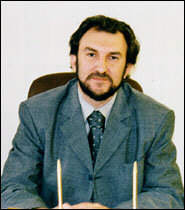 RELATIONS WITH INTERNATIONAL ORGANIZATIONS RELATIONS WITH INTERNATIONAL ORGANIZATIONS |
 MACEDONIA AND THE WORLD BANK MACEDONIA AND THE WORLD BANK |

Since Macedonia joined the World Bank and the International Development Association (IDA) in February 1993, the Bank has been working with the government to: (i) promote productive sector development; (ii) support stabilization and structural reform with analytical inputs and adjustment lending; and (iii) strengthen the social safety net, education, and health through investment lending and technical assistance.
The Bank responded quickly to the Kosovo crisis, taking the lead in organizing donor support and providing rapid assistance to the Macedonian government. The Bank sponsored an emergency informal donor meeting in April 1999 for the countries most affected by the crisis. A follow-up Emergency Joint G24/Consultative Group Meeting was held in Paris in May 1999, resulting in significant pledges of support, and a commitment to Macedonia's long-term development. The Bank made a significant contribution by processing within six weeks a US $50 million equivalent Economic Recovery Credit (approved in May, 1999), and a US $10 million equivalent Social Support Credit (approved in June 1999) to help mitigate the economic and social costs of the Kosovo crisis and structural reforms. A Post Conflict Grant of US$1.0 million, implemented by UNICEF, provided aid and services to Kosovar refugees.
The regional environment that has emerged after the Kosovo crisis is much changed from that at the time of the Country Assistance Strategy (CAS) issued by the Bank in 1998. As a result, the Bank prepared a CAS Progress Report in June 2000 to review implementation of the CAS, recent developments in the region and the project portfolio, and present the World Bank's plans to increase its impact on poverty alleviation. Given the recent significant change in the Bank's calculation of GNP per capita (because of newly available price data), the CAS Progress Report also recommends that Macedonia graduate from access to IDA resources. Thus, as of July 1, 2001, Macedonia will have access to IBRD financing only. A new CAS will be prepared and presented to the Board of Executive Directors in mid- to late-2001.
The overall assessment of the CAS Progress Report is that Macedonia has lagged in implementing the reform program envisaged in the 1998 CAS. Part of the delay can be attributed to the economic setback of Kosovo and part to shifting political priorities and increased cautiousness. However, the report also notes that since January 2000, the newly constituted government has been trying to generate momentum for further market-oriented reforms, supported by new regional initiatives that promise greater donor assistance and improved relations with the EU. | Assuming that the high case scenario is achieved in fiscal 2001, an ambitious adjustment program together with important infrastructure investments with strong institutional building activities would be supported by lending totalizing US$136 million. Thus, total Bank assistance over the CAS period could be as much as US$231 million equivalent.
Since Macedonia joined the Bank and IDA, total commitments approximated US$500 million for 17 projects, including 4 adjustment operations.

The Minister of Transports and Communications Ljupco Balkovski says that one of the World Bank's investment projects in Macedonia is related to the constructions of the Skopje - Tetovo motorway, which is already in its final stage. Another World Bank project is linked to the transformation and restoration of the Macedonian railways.

All these agreements signed between Macedonia and the World Bank have resulted in increased interest in the country by foreign investors, Mike Einik, US ambassador to Macedonia said.
"Macedonia is in need of investments, business opportunities, offers, that ought to be done by permanent staff who really holds the hands of the private investor and tells him what the company laws are, what the taxes are, where to find the workers and what the potential investment areas are, what they are available for", says Mrs. Marie-Helene Bricknell, Country Manager of the World Bank for Macedonia. With significant support by the World Bank and investments amounting to $US 560 million, "Macedonia successfully stabilized its economy ," Mrs. Bricknell said. |

